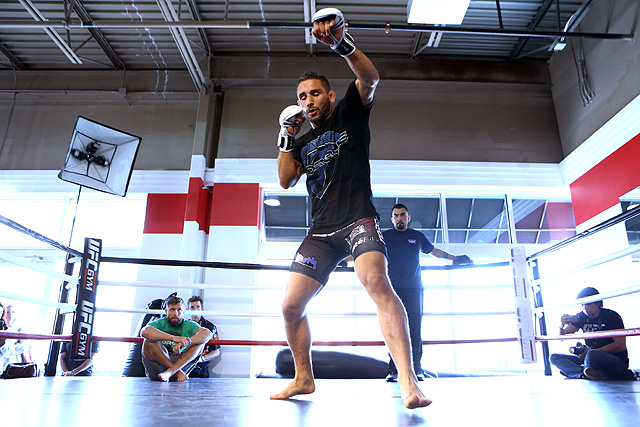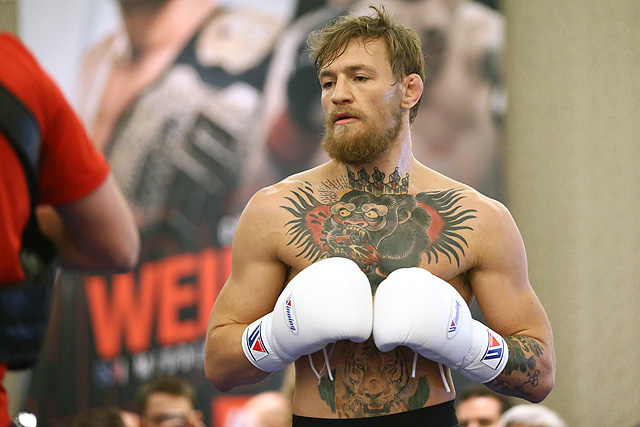Opinion: ‘Money’ vs. Money in the Main Event

Everyone plays favorites, whether or not they admit it. I'm not talking low-stakes this-or-that affairs either, like your favorite food or color of the rainbow. Those are the “favorites” that folks are expected to have. There's a dirtier subclass of favoritism in this world, a collection of hairs people prefer to leave unsplit or pretend as though they have.
It's very possible your greatest lover isn't your current partner. One of your students might be positively brilliant and make your other earnest pupils seem worthless. Your father might not just be the “bad guy” in the relationship, but a legitimately bad guy. If you've got two or more children, one of them doesn't measure up in some way, however microscopic. We try not to press or address these issues, but even Sophie made a choice.
Advertisement
Chad Mendes has done nothing wrong, nothing to “deserve” this. For seven years, he's worked his ass off to become a great MMA fighter, improving every step of the way. The only man to ever defeat him is Aldo, the greatest fighter ever under 155 pounds, whom he came closer to defeating than anyone during the Brazilian's six-year stranglehold on the division. It's strange, too, because McGregor's persona is so hyperbolic, his rise to MMA stardom so rapid, that you'd think the chance for his naysayers to revel in a loss to Mendes would be infinitely appealing.
Yet, the magnetism of Aldo-McGregor remains stronger than the
appeal of McGregor-related schadenfreude. I think Mendes
winning on points is the most likely scenario for the fight and I
wish him all the best in the Octagon, but his victory would be a
cruel waking from the Aldo-McGregor dream fight scenario. Sometimes
you can fall back asleep and recapture dreams, but it's very
rare.
Dana White will tell you this isn't pro-wrestling and the UFC can't pick winners and losers; this is “as real as it gets” and they're just there to promote the fights. Joe Silva and Sean Shelby will tell you that good matchmaking is about creating “win-win situations” because the sport is so wild and unpredictable. These statements are correct, but not entirely honest, as we know some outcomes are simply better for business. Fight promoters tend to do a poor job feigning impartiality at the best of times, but McGregor-Mendes is a different situation entirely.
No fight in UFC history has represented a greater boom-or-bust proposition, with this level of disparity between potential financial outcomes. If McGregor wins, he further legitimizes himself by defeating an elite featherweight with top-notch wrestling, the UFC dodges the bullet of Aldo's rib injury and it all amplifies what would've already been the biggest MMA fight of the year into an even bigger event when it happens. If Mendes wins, not only does it incinerate Aldo-McGregor, it suddenly takes the 145-pound division from its most engrossing era ever and sticks it in a time loop, setting up a third Aldo-Mendes fight. As outstanding as their second bout was, no one is clamouring for another go-around, least of all the oft-injured Aldo, who wouldn't think twice about dropping out of an appointment like that due to injury, especially with no real shot of making real money on pay-per-view.
You might think, “Well, the UFC has lost big fights before.” Gilbert Melendez's suspension for a failed drug test this week necessitated the 29th change to a UFC main or co-main event this year alone. However, in nearly 15 years promoting the UFC, Zuffa has not been faced with a potential loss quite like this.
Up until very recently, Zuffa's UFC ownership could be divided into two distinct periods: when nothing sold on pay-per-view and when everything sold on pay-per-view. From 2001 to early 2005, it didn't really matter what the company put into the cage in the sense that financial successes were relative and on a much smaller scale. Sure, UFC 40 was a smashing success and Tito Ortiz-Ken Shamrock was a brilliant bit of promotion, but a buyrate of 100,000 and a $1.5 million gate seems absolutely flaccid by today's standards. Demetrious Johnson sells more pay-per-views than that.
Consider UFC 33. Contextually, it was a devastating blow for Zuffa, staging the first-ever UFC card in Las Vegas, to have the Tito Ortiz-Vitor Belfort main event fell apart and be forced to plug in Kevin Randleman, then eventually Vladimir Matyushenko to replace “The Phenom” -- and that's before the PPV went off the air in the middle of the fight. But, it did 75,000 buys, it was 2001 and it was the night before Bernard Hopkins-Felix Trinidad. When Ortiz and Belfort finally did meet at UFC 51, they did a 105,000 buyrate and a $1.5 million gate and that was just before “The Ultimate Fighter” sent the UFC skyrocketing in terms of profitability. It's not like Ortiz-Belfort at UFC 33 would have drawn double or triple that amount.
In this period, fighters were infinitely more replaceable as outside of Ken Shamrock, MMA had nothing resembling a domestic superstar and the consumer base for a PPV event was comprised of hardcore fans, likely to be engaged enough with any replacement opponent to purchase an event anyway. Once TUF broke big and the UFC's salad days were underway, even weak European cards in the middle of the afternoon could sell 300,000 units on PPV. Sure, Chuck Liddell or Georges St. Pierre or Brock Lesnar could help the UFC notch a million buys, but with the company promoting half as many shows as compared to today, events were individually stronger, more vigorously promoted and the overall cultural appetite for the product was more ravenous.

(+ Enlarge) | Photo: D. Mandel/Sherdog.com
Will an Aldo showdown ever be the same
if McGregor loses to Mendes?
How many real blockbuster fights has the UFC actually lost for one reason or another? Out-of-era legacy fights don't count; it's not as if Anderson Silva-Matt Hughes would've been a “blockbuster” if they had met at UFC 36.
Dominick Cruz's myriad injuries don't add up to PPV revenue lost, just as Rory MacDonald could win the UFC welterweight title on Saturday night and see no financial difference in rematching Robbie Lawler versus defending against Johny Hendricks. True difference makers in MMA are few and far in between.
The closest is likely Mirko “Cro Cop” coming from Pride to the UFC and failing to fight Randy Couture, courtesy of Gabriel Gonzaga kicking his head off. Even then, Couture-“Cro Cop” was never actually officially announced and promoted and Couture still did over a half million buys and a $3.3 million gate against Gonzaga, one of the lamer title challengers in Zuffa history, at UFC 74. It's nowhere near the difference between Aldo-McGregor and Aldo-Mendes 3 and it's not as if the UFC spent millions of dollars promoting “Captain America” against combat sports' favorite Croatian. In fact, the biggest fights the UFC has missed out on historically are those sorts of theoreticals, like not snagging Fedor Emelianenko to fight Lesnar, Couture-Wanderlei Silva not materializing during the Pride FC era or not ever doing Georges St. Pierre-Anderson Silva in a stadium. But, these fights were hopes and pipe dreams, not fights made so damn real, only to slip through our fingers when we try to grasp them.
Over the years, the UFC has been blessed with breathing life into bouts that were previously left for dead. As previously mentioned, Ortiz-Belfort eventually happened and that was after finally getting Ortiz into the cage with Chuck Liddell, which took a zillion attempts over three-plus years as well. Liddell fought Wanderlei Silva after seven years of waiting and most people assuming and accepting the idea it would never happen. Antonio Rodrigo Nogueira eventually fought Couture, and Nogueira's twin brother is about to finally rematch Mauricio Rua a decade after their classic bout in Pride. Don't look now, but Frank Mir-Andrei Arlovski could still somehow happen 10 years after its supposed expiration date, too.
As good as the UFC has been about keeping windows of opportunity open for fights like this, the architecture of UFC 189's main event is thorny. McGregor is the reason for $7 million gate -- that and the UFC's “platinum seating” dynamic pricing scheme -- and why this event could still do over 600,000 buys without Aldo, but he's untested as a singular PPV draw. He is an exceptional fighter and competitively speaking, losing to Mendes would hardly preclude him from future greatness, but you can't calculate the impact of a loss for a fighter who hasn't actually drawn much yet. Is it so crazy to think that even if McGregor endured as a great fighter, his hype train would never quite be the same?
What if he lost to Mendes, then hurt his knee again and didn't win another fight for 12 to 18 months? What if someone fails a drug test? It is overwhelmingly dismissive to simply shrug and say “Eh, he'll get there,” even if McGregor is still improving and has the UFC's favor. The UFC would've taken any opportunity possible to rationalize Michael Bisping fighting Anderson Silva and it still never happened.
Aldo's future is uncertain. His laundry list of mounting and intensifying injuries means that he might not even be the next opponent for the McGregor-Mendes winner and he has been talking about moving up to 155 pounds for years now. Physically, there's no telling how prime Jose Aldo is going to be with us, assuming he still is, or how long he'll be at 145. Him and McGregor might both wind up being lightweights in two years, but if that's when they finally square off for the first time in the Octagon, will it really be for the better? I struggle to believe it. If McGregor wins, it could make the Aldo confrontation even bigger, yet even if he beats Mendes on Saturday night, it still guarantees us nothing.
There is no impartiality here and why would anyone expect to find it? The UFC is desperately searching for a bellwether moment that can reignite interest in its product and spent millions investing in exactly the kind of fight that could do it. Zuffa now stands to see it all evaporate in an instant, all because of a careless spinning back kick on a slippery mat in Brazil. It's not like Dana White and company are championing Conor McGregor as a superior human being, or actively conspiring to ruin to Mendes. They're fight promoters with interests and preferences wholly divergent and often counter to their talent. It's business, not personal, it's uncomfortable, but it's reality.
Chad Mendes stands on the edge of something great, but stands between the UFC and something even greater. The UFC is not anti-“Money,” it's just pro-money.
Related Articles






